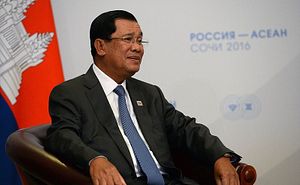What’s wrong with the prime minister of Cambodia, Hun Sen? He seems to be in a foul mood lately. His Cambodian People’s Party (CPP), which has run Cambodia for nearly four decades, has embarked on a new campaign against the political opposition, civil society groups, and the media, apparently looking ahead to national elections next July.
This week, the government shuttered the U.S.-funded National Democratic Institute and ordered its foreign staff to leave. Authorities also shut down several independent radio stations that broadcast Radio Free Asia and the Voice of America, and sent a spurious multi-million dollar tax bill to the nonpartisan Cambodia Daily, essentially setting the stage for its closure.
All this comes after a year in which the government has ramped-up criminal charges against human rights defenders and members of the political opposition, passed new laws setting the stage for the dissolution or neutralization of opposition parties, and made explicit threats of violence and torture against protesters.
The threats are hardly empty: In 2015, members of Hun Sen’s bodyguard unit badly beat two opposition parliamentarians outside the National Assembly. (Three members of a larger group captured on video served a year of suspended sentences before being released and awarded promotions.)
In July 2016, a prominent political commentator, Kem Ley, was gunned down in broad daylight five days after a CPP general called on the armed forces to “eliminate and dispose of” anyone “fomenting social turmoil.” For months, Kem Ley had been posting increasingly critical commentaries about Hun Sen, and continued doing so despite receiving death threats during the last weeks of his life.
Recently, Hun Sen said he would “eliminate 100 to 200 people,” if necessary, to protect “national security.”
Maybe Hun Sen is getting tired. After all, he’s been ruling Cambodia since 1985, and it probably hasn’t been easy. To maintain his grip on power through five elections of varying fairness since 1993, he has frequently resorted to violence, intimidation, buyoffs, and manipulation of the legislature and the courts. Tactics have shifted over time, the systematic unfettered violence of the 1990s giving way to subtler methods today: more ballot rigging, misuse of the law, threats. But the outcome of elections has always left Hun Sen in charge, whatever the supposed results, and whether or not observers considered the vote free and fair.
Through all of this, Hun Sen has outmaneuvered UN officials, donors, and foreign diplomats who gave lip service to a more inclusive, democratic Cambodia, but only sporadically made serious efforts to press for a genuine rights-respecting government.
Hun Sen has learned the value of at least pretending that the system is democratic. Moving beyond a totalitarian system in the decades after the Khmer Rouge regime, Hun Sen and the CPP figured out how to obscure or blur their human rights abuses, and also learned to tolerate enough freedom of speech and assembly to create the patina of democratic legitimacy.
This is what we’re seeing now. So far the government has put enormous pressure on independent media outlets and civil society and even shuttered some groups, but has stopped short of shutting everyone down. It prosecutes opposition leaders and dissidents, but then pardons a few. Officials use violence on some opponents, but more often just trumped-up legal charges. (Why bother with violence when the party-controlled courts can simply convict opponents and sentence them to prison?)
It’s important that governments with a stake in Southeast Asia see this situation for what it is. The Cambodian government’s actions in the last year are part of a campaign of intimidation, violence, and misuse of courts and law intended to weaken or neutralize political opposition ahead of the July 2018 vote and hamper efforts by independent groups to monitor the election—all to ensure the continued rule of Hun Sen and the CPP.
What can be done to press for a genuinely democratic Cambodia? One answer may lie at the United Nations. In September, the UN Human Rights Council in Geneva will consider a new resolution on Cambodia, and several human rights groups, including Human Rights Watch, are calling for a resolution that details the deteriorating human rights situation and recommends steps needed to address it.
The resolution should task the UN High Commissioner for Human Rights with preparing a report on the rolling crackdown and the actions the government and international community need to take to ensure free and fair elections in 2018. A UN report on the latest abuses, based on objective reporting by professional staff, can help ensure that Hun Sen doesn’t politicize the situation and claim that reported abuses are merely partisan attacks.
Hun Sen and the CPP will resist international efforts to address human rights violations in Cambodia. Presumably they’re afraid that free and fair elections will sweep them from power; that’s why they’ve committed abuses against the political opposition, the independent media, and critical organizations.
But Cambodia’s allies and donors can and should press Hun Sen to end the repression of the opposition, allow free expression, and permit monitoring of the human rights situation. Hun Sen should at least be put on notice that his actions will affect how the international community views the legitimacy of the 2018 elections. He may be thinking that he can steal the vote next year, but he needs to understand that if he does, he’s going to be called out for it.
John Sifton is Asia advocacy director at Human Rights Watch.

































